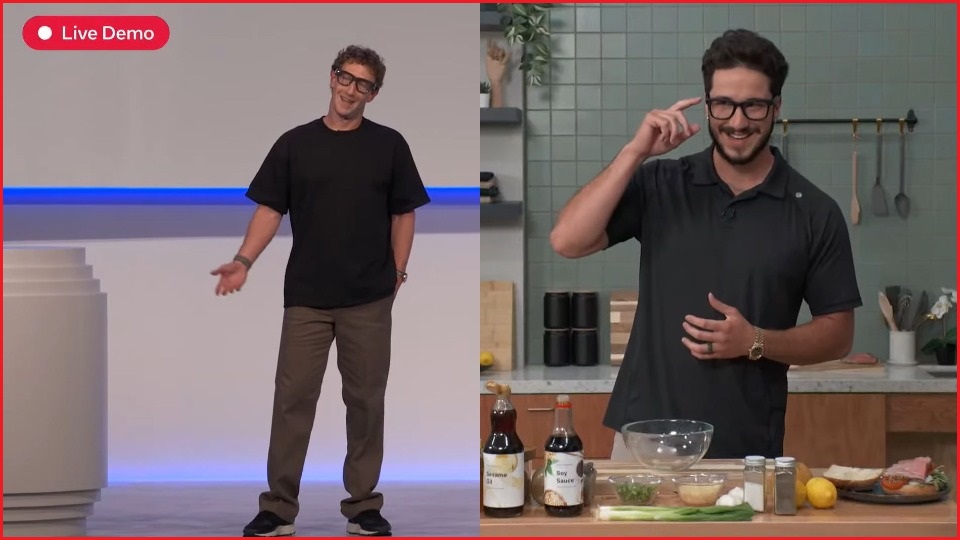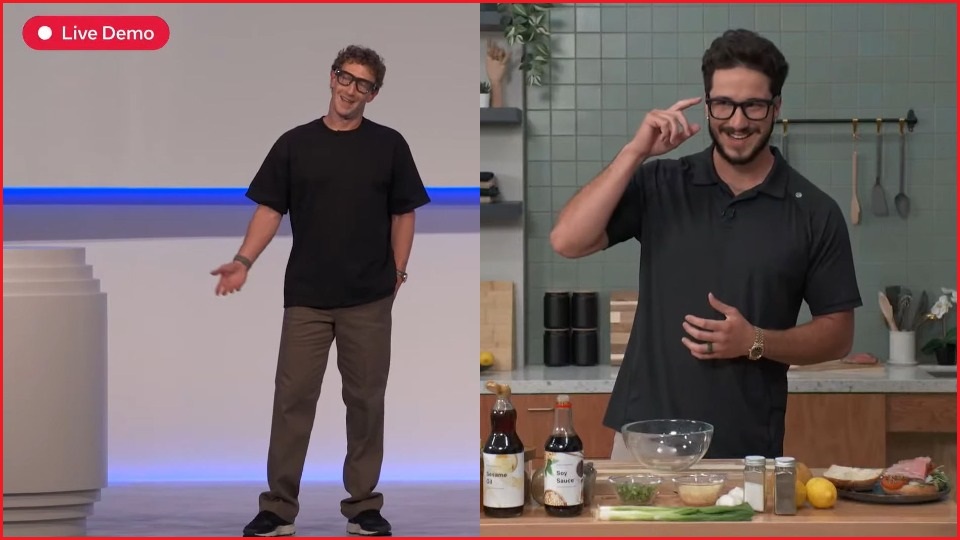
Meta CEO Mark Zuckerberg (left) and influencer Jack Mancuso (right) attempted to give live demonstrations during Meta Connect 2025. Images: Meta / YouTube
Technical issues caused several awkward moments for Meta CEO Mark Zuckerberg on Thursday, Australian time, when live demonstrations of the company’s new smart glasses and live AI assistant did not work as planned.
The social media giant used its Meta Connect event in California to introduce new models of its AI-focused smart glasses, including a new device called the Meta Ray-Ban Display that featured a tiny screen which could be controlled by small wrist movements measured by a device called the Neural Band.
The event’s first live demo showed Zuckerberg using the Meta Ray-Ban Display while he walked onto the stage at Meta’s Menlo Park headquarters, and appeared to work without a hitch.
However, the second demo — in which influencer Jack Mancuso asked Meta’s live AI to help him make a steak sauce — did not go as planned.
Wearing Meta smart glasses, Mancuso asked the AI what he should do first with the ingredients he had gathered on a kitchen counter.
After the AI appeared not to hear him the first time, he asked again — only for Meta’s assistant to tell him he had “already combined the base ingredients”, when he actually had not.
A confused Mancuso asked the AI again what he should do first, to awkward laughs from the crowd.
The AI gave the same response, telling him he had already combined the base ingredients and he needed to grate some pear into the sauce.
“I think the Wi-Fi might be messed up, sorry,” Mancuso said, before throwing back to Zuckerberg, who tried to laugh off the mishap.
“The irony of the whole thing is that you spend years making technology and then the Wi-Fi at the day kind of catches you,” he joked.
“What do I do first?” Mark Zuckerberg’s live AI glasses demo completely screws up, audience laughs at the embarrassing failure. pic.twitter.com/FsgGEiWLsP
— Mike Sington (@MikeSington) September 18, 2025
WhatsApp video call goes unanswered
Just over 10 minutes later, Zuckerberg ran into his own issue when demonstrating the Meta Ray-Ban Display.
After successfully sending several text messages through the glasses using handwriting tracked by the Neural Band on his wrist, Zuckerberg attempted to accept a WhatsApp video call, but could not answer it.
“That’s too bad, I don’t know what happened,” he said.
Attempting to answer a second call from the same contact, the glasses still would not connect.
“This is, uh, you know — it happens,” Zuckerberg said.
After a few more attempts, the CEO told his team to “try it again, I keep on messing this up”.
Again, it failed.
“I don’t know what to tell you guys,” a frustrated Zuckerberg said.
“… You practice these things like a hundred times, and then you never know what’s gonna happen.”
Mark Zuckerberg’s Meta AI glasses demo failed in EPIC fashion today 🤣pic.twitter.com/O0UFeoCar7
— Chief Nerd (@TheChiefNerd) September 18, 2025
Early adopters expected to embrace Meta Ray-Ban Display
Meta used its latest event to announce updated versions of its display-less Ray-Ban smart glasses, a new sports-focused model in collaboration with Oakley, and the higher-end Meta Ray-Ban Display — which did not receive an Australian release date.
Leo Gebbie, a technology industry analyst at CCS Insight, wrote that he believed the Meta Ray-Ban Display’s $US799 ($1,200) price, which included the Neural Band, was a “relatively low” and “aggressive price” for an augmented reality device — but also “very high for what is at present an accessory”.
“As such, we expect that it will only prove popular with early technology adopters initially,” he said.
“We do not believe Meta will be too concerned about the level of adoption of the new glasses and will instead see them as a proof of concept rather than a serious play for the masses.”
The new second-generation Ray-Ban Meta smart glasses are available in Australia from $599, while the new Oakley Meta Vanguard would be available from $789 on 21 October, Meta said.
The company has continued to heavily invest in smart glasses because Zuckerberg believes the form factor is the best way to integrate AI superintelligence — a theoretical future where AI is smarter than humans — into consumer devices.
Meta has spent billions of dollars to scale its AI infrastructure and recruit AI researchers — including many from ChatGPT creators OpenAI — and has formed a new team with the goal of creating superintelligent systems.
Unlike Meta and other tech giants such as Apple, Samsung, Google, Microsoft, and Amazon, OpenAI is yet to release a consumer device with AI features, but the company has a range of such products in the works.
Apple is reportedly developing augmented reality glasses of its own, while a collaboration between Google and Samsung is expected to yield new AR glasses from those two companies in the coming years.

